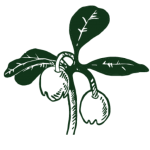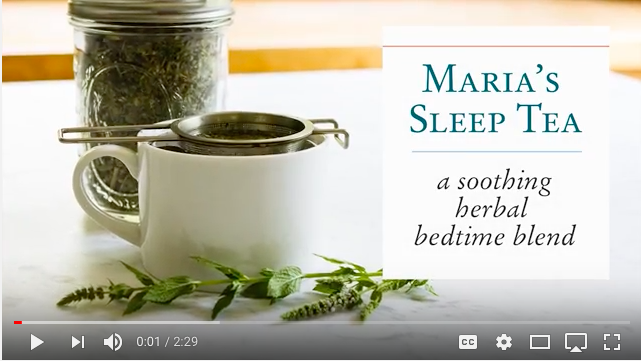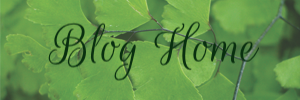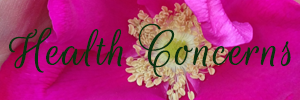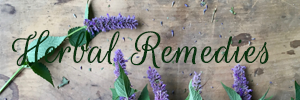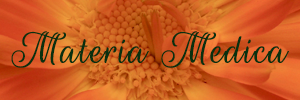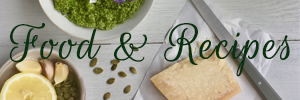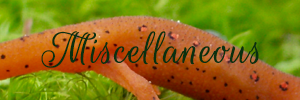Sleep Resources Hub & Blog!
Get Your Slides Here, also Several resources on sleep are available in this blog (see bottom of blog for resource links) and Maria’s new book (with accompanying live streamed mini course)
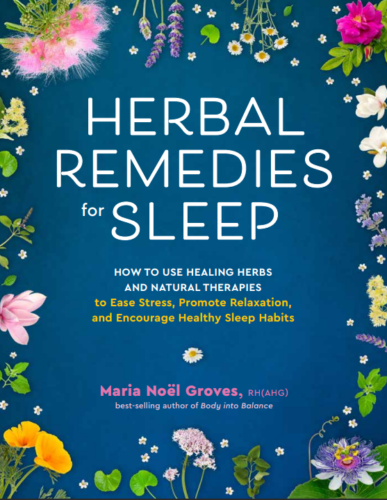
Order my new (2024) book, Herbal Remedies for Sleep HERE.
- Address daily stress
- Sleuth out and address sleep apnea. Potential signs of sleep apnea include snoring, waking gasping for air, your bed-partner notices you stop breathing for short bursts while you sleep, waking with a dry mouth or headache, daytime fatigue, hypertension, night sweats, waking in stress mode around 2 am… Talk to your doctor for a sleep study referral. Though there are some natural supports for sleep apnea (like sleeping on your side, losing weight, avoiding triggering foods like alcohol, and addressing allergies and congestion), the most effective approaches are those prescribed by doctors and sleep specialists such as CPAP machines and mouth guards. Sedating herbs are not appropriate. In sleep apnea, the body is waking because it’s not getting enough oxygen — the goal is to get it more oxygen, not sedate it so it doesn’t wake up.
- Unwind in the evening and keep electronics out of the bedroom — shut down at least an hour or more before bedtime by turning off screens and dimming lights. Use apps and “night mode” settings that switch screens to emit less blue light after dark. Some people wear special glasses for this as well.
- Avoiding stimulants after noon and at night (especially an hour or two before bedtime) — avoid or limit: caffeine, energizing herb and supplements, eating food late or big dinners, watching TV, or checking email, alcohol consumption. Different people are different. For example, some people won’t sleep if they take ashwagandha after noon while others find taking it before bed helps them sleep.
- Eat and drink less before bedtime. Just two alcoholic drinks can really disrupt sleep quality! Late-night snacks tend to increase the likelihood of waking up in the middle of the night. Coffee/caffeine can be a problem anytime in the afternoon/evening. Some people are surprised to find that even their morning cups of coffee disrupt sleep. Some supplements or herbs may disrupt sleep as well.
- Set the mood for relaxation. Sleep in a dark, quiet environment; and eating a balanced, whole-foods diet so that your body can make healthy neurotransmitters. Keeping the bedroom cool, using heavy blankets and wearing socks, and wearing an eye mask (or heavy window curtains) and using ear plugs or a white noise machine might help.
Most nights, reading a boring book or the latest botanical medicine study at bedtime is enough to take my mind off other things and bores me to sleep, and I adore my sleep mask. As you create a sleep-friendly lifestyle or when you need an extra hand, here are some herbs to try that might help you get a better night’s rest tonight. All of these herbs are commonly available in stores and online. Favorite brands of mine include Gaia Herbs, Wise Woman Herbals, Urban Moonshine, Herb Pharm, Herbal Energetics, and Mountain Rose Herbs.
General Recommendations on Dosing and Cautions for Sedatives
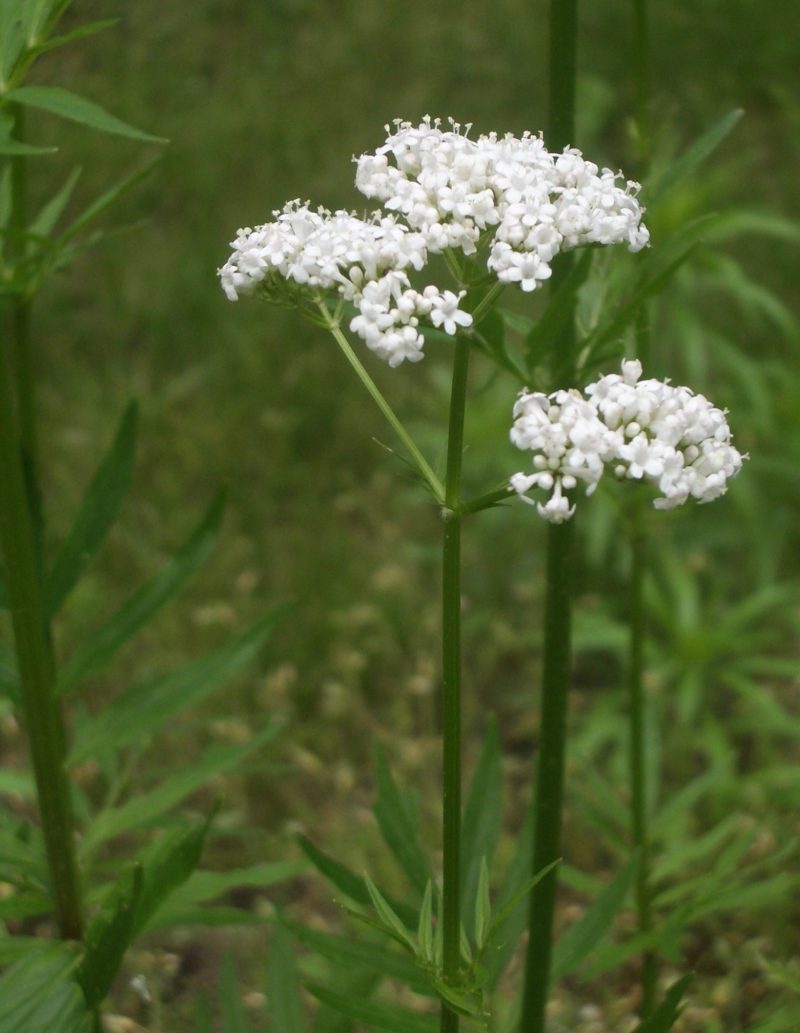
Valerian (Valeriana officinalis)
This stinky root is the most famous sleep herb, hands down. Almost every herbal sleep formula contains it because it often works well to promote deep sleep, muscle relaxation, and an overall calming effect on the Central Nervous System. When I first started out with insomnia, this was my go-to herb, and I still keep a bottle of the tincture (the most effective way to take it) on my bedside table for nights when I feel too wound up or if I wake up in the middle of the night. That said, valerian really doesn’t work for everyone – some people find it makes them more jittery and others feel groggy or get weird dreams. It tends to work better for people with a cold constitution (cold hands and feet, thin body type, tendency towards anxiety) and worse for people with a hot constitution (always hot, larger body type, tendency towards anger and frustration). If it doesn’t work for you, don’t worry – there are plenty of other calming herbs out there! And… for the record, valerian does not have any relationship with the drug Valium except that the names sound similar. Neither valerian nor the other herbs mentioned here are addictive, and they are generally extremely safe but should not be combined with anti-anxiety and other sedative drugs. Due to its unpleasant flavor/aroma and activity, this works best as a fresh root tincture, but some people do enjoy it as a dry root tea infusion (blech). The scent is reminiscent of perfume-y dirt, skunk, and stinky feet while the flavor is more like sweet, perfume-y dirt.
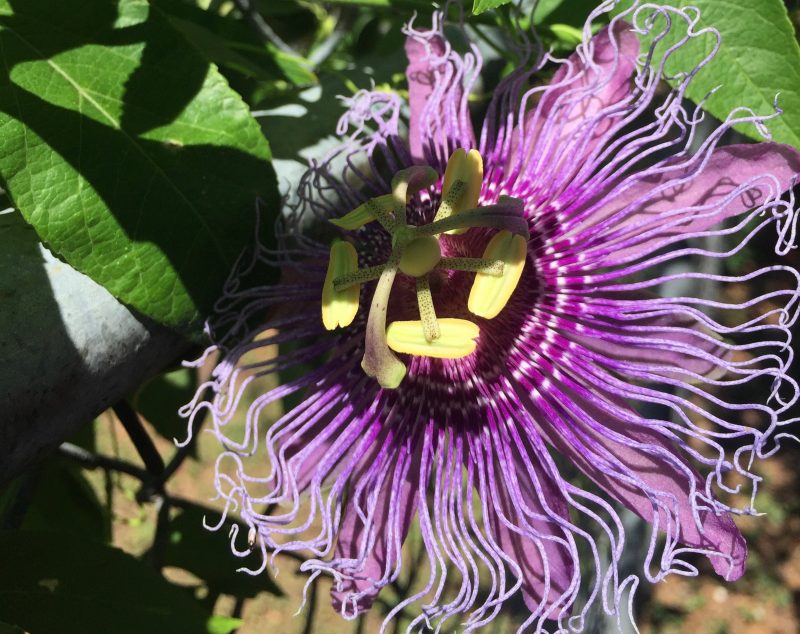
Passionflower (Passiflora incarnata)
Above-ground (aerial) parts of this gorgeous flowering vine from the southeast will lull almost anyone to sleep. Even though valerian is the most-studied medicinal herb for sleep, the effects have been quite mixed. Passionflower has performed far better in the few studies that have been conducted on it. In one, a combination of herbs including passionflower worked as well as a conventional sleep medication. In another, just one teaspoon of dry herb brewed as tea improved sleep quality within one week compared to placebo. Passionflower acts as a safe sedative-hypnotic relaxing herb, bringing everything down several notches so you can sleep more easily and more deeply. I tend to use it as a tincture or tea, and it’s useful fresh or dry. The flavor is mild and easily spruced up with flavorful herbs like spearmint or holy basil. See my sleep tea recipe below. As a tincture, it blends well with other herbs and can be used fresh or dry. Lately, I enjoy blending it with skullcap and magnolia for myself and clients. (Magnolia bark is becoming a fast favorite ingredient of mine for sleep blends when stress and waking in the middle of the night are problems, but unfortunately it’s not commonly available in commerce. We can use our local species, but it’s more popular as an herbal in traditional Chinese medicine.) Click here to learn more about passionflower — I did a whole blog on it!
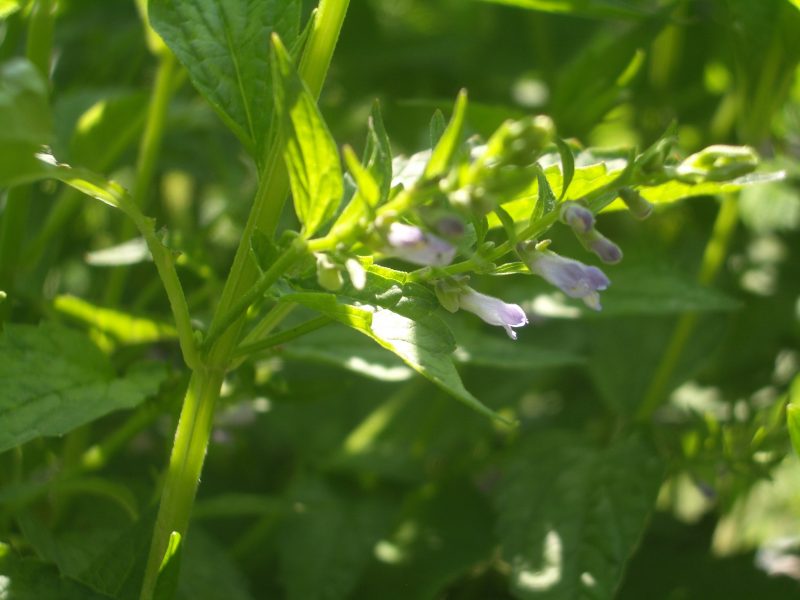
Skullcap (Scutellaria lateriflora) & Lemon Balm (Melissa officinalis)
These lesser-known relaxing herbs work very well for almost any body type to relax the nervous system, quell anxiety, and promote sleep. They’re mild tasting enough to take as tea (though much better with mint and honey added) and can also be taken as tinctures. Capsules are convenient but don’t always work as well. Both skullcap (shown above) and lemon balm are much more potent when fresh (such as a fresh plant tincture), serviceable as freshly dried herb as tea, and prone to losing more potency over time or being low quality form commercial sources. Both herbs nourish the nervous system, ease anxiety, and improve sleep, but they may be able to be taken during the day without being overly sedating, especially lemon balm. Lemon balm is also uplifting and improves focus. They’re generally very safe, popular even for children, but still use caution with sedative drugs as described already. There have been issues with adulteration of skullcap, so only purchase this herb from reputable suppliers, preferably certified organic rather than wild-crafted or unspecified sources. I prefer to grow my own skullcap (I purchase organic seedlings from Found Well Farm in Pembroke in May, Terra Basics in Chichester, or from other growers at the NH Herb & Garden Day event, sometimes it winters over) or get it direct from an organic farm such as Foster Farm Botanicals in Vermont, Terra Basics in Chichester NH, or Zack Woods Herb Farm in Vermont – it sells out quickly and has good and bad years. (Farms also vary in their availability year to year.) Online/via mail, consider Strictly Medicinal Seeds for seeds and live plants and Companion Plants for live plants. Be aware that this plant is often adulterated or confused with other plants, so wait for it to flower to key it out and identify 100 percent. Even otherwise good bulk herb suppliers tend to have poor-quality skullcap, and buying direct from the organic farm not only helps ensure identity but also increases the quality of this highly perishable herb. Reputable tincture companies include Gaia Herbs and Herbalist & Alchemist. This applies to lemon balm in terms of quality as well, though adulteration is not a problem and it’s very easy to grow as a perennial. Refresh your tinctures every few years. You’ll often find these herbs in herbal tea blends and sleep formulas, perhaps in combination with valerian and some of the many other great relaxing herbs out there. If you’re looking for a valerian-free sleep formula (which is rare — most sleep blends contain valerian), one of the best is Peaceful Nights by Herbal Energetics, made right up the road in Northfield, NH. Flora Health makes a nice tea blend called Sleep Well with chamomile, skullcap, and passionflower (flavored with lemongrass and spearmint), too.
Rescue Remedy Sleep & Flower Essences
Flower essences like Rescue Remedy Sleep are highly dilute flower remedies preserved in brandy and water, and only one to three drops are necessary. Because they are so dilute (much like homeopathic remedies) yet still very effective for many people, they’re perfect for children, pregnant women, and people who are taking medications. I make my own flower essences from herbs in my garden like valerian, lavender, and blue vervain, but the Bach Flower Essences are much more widely available in stores. Rescue Remedy Sleep combines the traditional anti-anxiety formula with White Chestnut, a flower essence used for thoughts that go circling around and around the brain. Other flower essences that I like include lavender (spirit calm), valerian (deep peace), and St. John’s wort (light-filled protection from nightmares), which are available from small-scale sellers like Lichenwood Herbals, Green Hope Farm, and Delta Gardens.
Lavender & Essential Oils
Just the scent of this popular herb can help some people fall asleep. Try putting a few drops on a cloth and tucking it into your pillowcase. You can also make a sachet of the dried flower buds, perhaps with some mugwort (to increase dreams) or hops (for better slumber), to slip under your pillow.
Additional Herbs
There are so many great herbs you can use for sleep, and so much of it is individual. I’ve covered those that I love and use the most and that are the most commonly available. You can grow most or all of them, too. Additional sleep herbs include magnolia bark or flower, chamomile (of course!), ashwagandha, holy basil/tulsi (lovely in combination with lemon balm), milky oat seed, reishi mushroom, hops, wood betony, blue vervain, lavender (dried herb — not essential oil — as a tea or tincture), mugwort, and mimosa/albizia bark or flower. Magnolia bark tincture or extract in capsule form tends to help modulate the stress hormone cortisol to reduce waking in the middle of the night in start mode (also look at the potential triggers mentioned earlier). You can use an organically culltivated tree to make your own, but it’s hard to find in commerce (Gaia’s HPA/Stress Sleep blend has it as an ingredient). Additional useful supplements include magnesium, theanine, tryptophan/5-HTP. Warm honey milk (perhaps with ashwagandha powder). They’re all a bit different, so you’ll want to do your research or consult a practitioner to see what’s most appropriate for you. For example, ashwagandha interferes with my sleep, but for most people it improves it. Always start low and listen to your body! It will tell you what does and does not work.
Maria’s Sleep Tea Recipe
This is tasty and effective for most people! Make sure to get your herbs from a reputable source like Zack Woods Herb Farm, Foster Farm Botanicals, Mountain Rose Herbs, or your own garden.
- 1/2 teaspoon lemon balm leaf/aerial parts
- 1/2 teaspoon passionflower leaf and flower/aerial parts
- 1/2 teaspoon skullcap leaf and flower/aerial parts
- 1/2 teaspoon spearmint leaf/aerial parts (for flavor)
- 1 teaspoon honey (optional)
Steep your herbs in a 4-6 ounce teacup for 15 minutes. Add honey, and enjoy shortly before bedtime. Do not make a big mug of this — you don’t want to need to get up to pee in the middle of the night. This tea is safe for children over the age of 2, but divide the dose down by weight, assuming this dose for a 150-pound adult (so 1/3 the amount for a 50-pound child).
Learn More About Sleep Herbs
Maria’s Sleep Mini-Course: 2024 LiveStream Webinar Series on Sleep starts in June (free with promo code on page 178 of Maria’s sleep book), will be available on-demand after classes air
Short Free Public Webinar & Articles from Maria on Herbs for Sleep
- Indications for Herbs for Sleep Webinar | HerbRally – Enjoy this fun, free 1-hour dive into herbs for sleep, pros, cons, and tips on this very herb-forward webinar. Slides Here.
- Maria’s (newer) short Sleep Support blog I wrote, this one on the Concord Food Co-op blog, written in late December 2021 with studies annotated
- Growing Peaceful Herbs handout
- Sleep Tea video showing off lemon balm, skullcap, and passionflower produced by Storey Publishing to go with my first book Body into Balance
- Check out this sleep herbs article by one of my colleagues, Liane Moccia, who practices as an herbalist in Andover, Massachusetts. She did a GREAT job distilling some of my favorite sleep herbs down to their useful nuggets, with links to studies as well. She includes more detail on California poppy, chamomile, etc.
- Maria’s Longer Article on Sleep Herbs annotated with studies and sources on the Herbal Academy Herbarium (member access is needed, but you’ll get all sorts of awesome articles in your subscription)
- This topic is covered in both my books in greater detail and with more recipes — Body into Balance and Grow Your Own Herbal Remedies and in even greater Depth in Herbal Remedies for Sleep
- Blogs + Resources (including videos, podcasts) on Similar topics by Maria:
Calming Herbs, Uplifting Herbs, Brain Herbs
Podcasts by Maria on Sleep
Much similarity and some differences among them!
- Herbal Remedies for Sleep | Seeds and Weeds Podcast with Bevin Cohen released December 2024
- Herbal Remedies for Sleep | Plant Love Radio – I really enjoyed this chat with Lana recorded much earlier in 2024, released in June.
- Lemon Balm | Herbs with Rosalee with Rosalee de la Foret (also on YouTube and wherever you listen to podcasts)
- Herbal Remedies for Sleep | Tea Talks Roundtable with Jiling Lin, Tesia Love, and Maria (Mountain Rose Herbs Herbal Radio, 2024)
- Herbs and Other Strategies to Support Sleep (on In the Clinic with Camille Freeman, 2024)
- Coming in May – webinar with HerbRally, podcast/.video/recipe on lemon balm with Rosalee, podcast with Lana on Plant Love Radio
Four-Part Series on Resilience Radio
- First: Episode 65: Sleep and Dementia (on Resilience Radio with Irvin, 2024)
- Second: Episode 68: Sleep, Pain and Night Terrors(on Resilience Radio with Irvin, 2024)
- Third: Episode 71: Sleep Ergonomics Herbs and Diet (on Resilience Radio with Irvin, 2024)
- Forth (longest one): Episode 72: Herbal Support for Sleep(on Resilience Radio with Irvin, 2024)
Sweet dreams!
Order Maria’s book, Herbal Remedies for Sleep HERE.
Clinical herbalist Maria Noël Groves sees clients and teaches classes at Wintergreen Botanicals Herbal Clinic & Education Center in Allenstown, New Hampshire.
The statements made on this blog have not been evaluated by the FDA and are not intended to diagnose, prescribe, recommend, or offer medical advice. Please see your health care practitioner for help regarding choices and to avoid herb-drug interactions.
This blog originally appeared on the Concord Food Co-op site and has been reprinted with permission.
It is an updated version of my blog that appeared on December 17, 2018.
Latest extra resource updates in 2024
